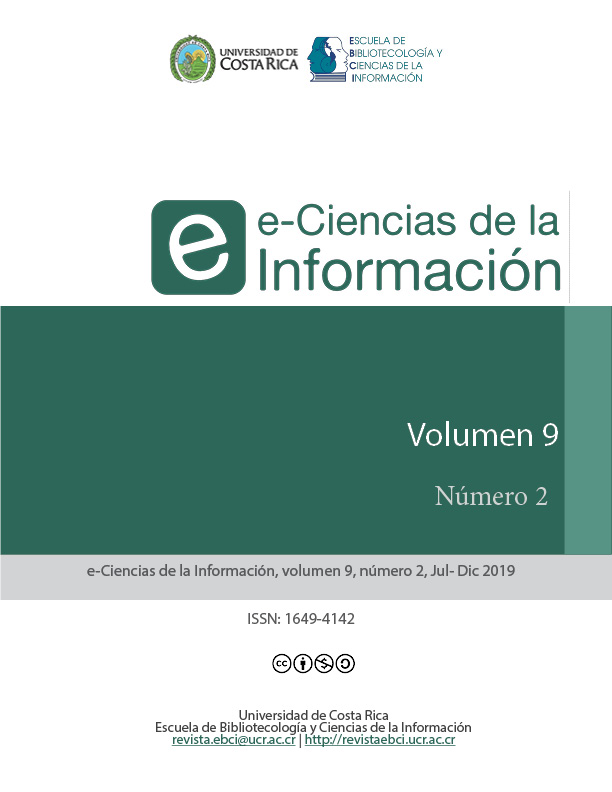Resumen
La disciplina Informática muestra distintas evidencias de sus abordajes teóricos y empíricos. Es así como estudios fundamentados en la Ingeniería del Software Basada en la Evidencia proporciona un marco lógico-metodológico de abordaje En esta indagación se releva el abordaje desde la Ingeniería del Software, en particular, el tratamiento de sus temas desde la guía SWEBOK, y cómo son representadas algunas de estas áreas en los Trabajos Finales de Graduación de estudiantes de la carrera Licenciatura en Sistemas de Información en el ciclo lectivo 2016. En el documento se expone el marco metodológico, que argumenta la propuesta. Los resultados evidencian el predominio de una de las áreas de conocimiento lo que podría explicarse por la línea curricular asumida desde la carrea que se trata y profundiza en este espacio de formación profesional y personal. La investigación descrita muestra la preferencia del estudiantado al elegir las temáticas de finalización de la carrera, en particular, las asociadas a las áreas de conocimiento tratadas en SWEBOK, por lo que, estos indicadores se podrían utilizar para definir diferentes estrategias, que orienten a la elección de temas con connotación regional, nacional o multinacional.
Citas
Association for Computing Machinery. (2019). About the ACM Organization. Recuperado de https://www.acm.org/about-acm/about-the-acm-organization
April, A. (2008). Software Maintenance Management: Evaluation and Continuous Improvement. Estados Unidos: IEEE Computer Society.
Barchini, G. E., Sosa, M. y Herrera, S. (2004), La informática como disciplina científica. Ensayo de mapeo disciplinar. Revista de Informática Educativa y Medios Audiovisuales, 1(2), 1-11.
Bourque, P. y Fairley, R E. (2014). SWEBOK Guide to the Software Engineering Body of Knowledge, Version 3.0. IEEE Computer Society. Recuperado de https://www.computer.org/education/bodies-of-knowledge/software-engineering
Dunkel, A. y Gödel, A. (2015). Búsqueda de Evidencia Convincente en los Estudios de Ingeniería de Software, Revista Antioqueña de las Ciencias Computacionales, 5(1), 25-31.
Genero, M. (2016). Ingeniería del software basada en la evidencia. Escuela Superior de Informática, Universidad de Castilla-La Mancha.
Giró J. F, Disderi, J. y Zarazaga, B. (2016). Las causas de las deficiencias de la Ingeniería de Software. Ciencia y Tecnología, 16, 69-80.
Institute of Electrical and Electronics Engineers. (2019). About IEEE. Recuperado de https://www.ieee.org/about/index.html
Kumar, V., Ansari, A. Q., Patki, T. y Patki, A. B. (2008). Applications of evidence based software engineering for IT systems. Review of Business and Technology Research, 1(1), 1-7.
Mariño, S. I. y Alfonzo, P. L. (2014). Implementación de SCRUM en el diseño del proyecto del Trabajo Final de Aplicación. Revista Scientia Et Technica, 19(4), 413-418.
Mariño, S. y Alfonzo, P. (2017a). Ingeniería de software basado en evidencia: soportes como producto académico. Enl@ce Revista Venezolana de Información, Tecnología y Conocimiento, 14(1), 50- 68.
Mariño, S. y Alfonzo, P. (2017b). Evidencia de disciplina Informática en producciones finales de carrera del año 2015. En Congreso Internacional de Ciencias de la Computación y Sistemas de Información - CICCSI 2017. Argentina.
Pigoski, T. (2015). SWEBOK Knowledge Area Description for Software Evolution and Maintenance [Version 0.5]. Recuperado de: http://citeseerx.ist.psu.edu/viewdoc/download?doi=10.1.1.573.5287&rep=rep1&type=pdf
Red de Universidades con Carreras en Informática. (2017). Documento Preliminar de Recomendaciones Curriculares de la RedUNCI 2016-2017. Recuperado de http://redunci.info.unlp.edu.ar/docs/RecomendacionesCurriculares-LibroRedUNCI-2017-9-Completo.pdf
Sommerville, I. (2011). Ingeniería de software [9na Ed.]. Madrid, España: Pearson Educación.


